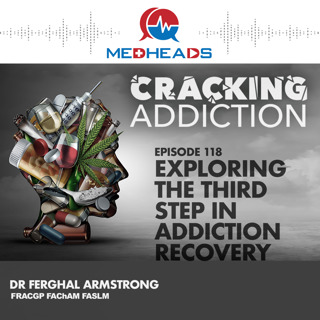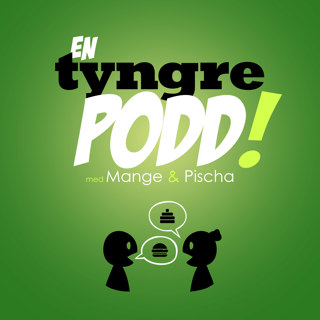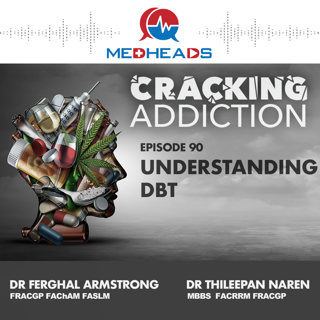
Understanding DBT: Four Components and Three Pillars Explained
Dr. Laura explains in more detail about Dialectical Behavior Therapy (DBT) and its four core components: distress tolerance, interpersonal effectiveness training, mindfulness, and emotional regulation. DBT is a type of therapy that helps people regulate their emotions and develop coping skills.Dialectics is a key concept that runs through each of the modules of DBT. It involves accepting both sides of a situation rather than seeing things in black and white, either-or terms. For example, instead of thinking "I'm in pain and it's never going to end," a dialectical approach would be to acknowledge the pain but also recognize that it will eventually pass.The three pillars of DBT are dialectics, Cognitive Behavioral Therapy (CBT), and mindfulness. CBT involves identifying and changing negative thought patterns, while mindfulness involves being present in the moment and non-judgmentally observing one's thoughts and feelings.Originally developed to help women with borderline personality disorder, DBT is now used to help people with a wide range of problems, including substance abuse issues. DBT provides individuals with a toolkit of skills to help them manage difficult emotions, communicate effectively, and cope with stressors in a healthy way.Overall, the episode provides a brief but informative introduction to DBT and its core components, as well as its applications in various contexts.Discussions and comments in our videos are for informational purposes only and should not replace the advice of your medical professional. Please consult with your doctor before making any changes to your medical treatment or lifestyle.Latest Blogshttps://www.meducate.com.au/blogAbout Meducate ®Meducate provides online education for doctors, clinicians, health professionals and the public.See the website to browse the many different talks and courses available https://www.meducate.com.au
3 Maj 202318min
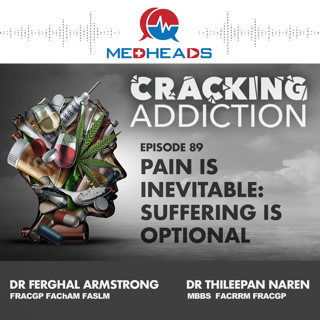
Pain is inevitable: suffering is optional
I chat with Dr Laura Petracek about unnecessary suffering. There is a famous saying: ”Pain is inevitable, suffering is optional”.We all experience inevitable pain such as bereavement, separation, illness and ageing. Suffering is optional in that it is a function of how we react to the pain. Maladaptive coping strategies cause optional suffering. These include drug or alcohol misuse, or maladaptive psychological constructs such as wishing for a different outcome, anticipating the worst, ruminating on the outcome, or trying to change the outcome. Acceptance is the key to avoiding unnecessary suffering.When we practice acceptance and focus on what we can control rather than what we can't, we can reduce our suffering and increase our resilience. This can include accepting the reality of the situation, letting go of our attachment to a specific outcome, and finding ways to move forward in a positive direction.It's also worth noting that seeking support from others, such as friends, family, or a therapist, can be a helpful way to cope with pain and avoid unnecessary suffering. By sharing our experiences and emotions with others, we can feel less alone and gain new perspectives on our situation.Discussions and comments in our videos are for informational purposes only and should not replace the advice of your medical professional. Please consult with your doctor before making any changes to your medical treatment or lifestyle.Latest Blogshttps://www.meducate.com.au/blogAbout Meducate ®Meducate provides online education for doctors, clinicians, health professionals and the public.See the website to browse the many different talks and courses available https://www.meducate.com.au
26 Apr 202318min
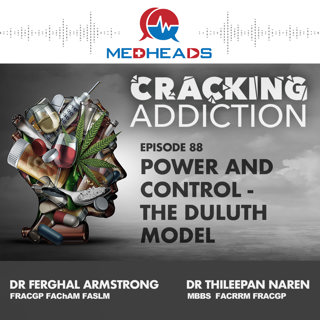
Power and Control - The Duluth Model
In this episode Stephen Herd and I continue our discussion on the power and control wheel.The Power and Control Wheel was developed by a group of activists in Duluth, Minnesota, in the 1980s, who recognised the need for a comprehensive approach to address family violence. The Duluth Model is based on the belief that domestic violence is a result of the abuser's desire for power and control over their partner.According to the Duluth Model, domestic violence is not caused by anger, substance abuse, or mental illness. Instead, it is a deliberate tactic used by abusers to control and dominate their partners. The Duluth Model identifies several different types of abuse, including physical abuse, sexual abuse, emotional abuse, economic abuse, and psychological abuse. These are presented in the Power and Control Wheel as a circular diagram that outlines the different tactics used by abusers.The Power and Control Wheel helps to illustrate the cyclical nature of family violence. The abuser may use a combination of different tactics to gain control over their partner, and the victim may respond with different coping strategies, such as walking on eggshells or trying to appease the abuser. Over time, the abuse can escalate, and the victim may feel trapped and unable to escape the cycle of violence.The Duluth Model and Power and Control Wheel are useful tools for understanding the dynamics of family violence and identifying ways to address it. They help to shift the focus away from the victim and onto the abuser, recognizing that family violence is a result of a deliberate choice made by the abuser to maintain power and control.There are several different approaches to addressing family violence, including criminal justice interventions, civil protective orders, and community-based interventions. The Duluth Model emphasizes the need for a coordinated community response to address family violence, including law enforcement, the court system, and community-based organizations.One of the strengths of the Duluth Model and Power and Control Wheel is that they recognise the importance of a multi-disciplinary approach to addressing family violence. Family violence is a complex issue that requires a coordinated response from multiple sectors, including the criminal justice system, social services, healthcare, and educationDiscussions and comments in our videos are for informational purposes only and should not replace the advice of your medical professional. Please consult with your doctor before making any changes to your medical treatment or lifestyle.Latest Blogshttps://www.meducate.com.au/blogAbout Meducate ®Meducate provides online education for doctors, clinicians, health professionals and the public.See the website to browse the many different talks and courses available https://www.meducate.com.au
19 Apr 202313min

The Power and Control Wheel
In this episode Stephen Herd and I discuss the Power and Control Wheel: a widely used tool to help understand the dynamics of family violence and identify ways to address it.The Power and Control Wheel was developed by a group of activists in Duluth, Minnesota, in the 1980s, who recognised the need for a comprehensive approach to address family violence. The Duluth Model is based on the belief that domestic violence is a result of the abuser's desire for power and control over their partner. According to the Duluth Model, domestic violence is not caused by anger, substance abuse, or mental illness. Instead, it is a deliberate tactic used by abusers to control and dominate their partners. The Duluth Model identifies several different types of abuse, including physical abuse, sexual abuse, emotional abuse, economic abuse, and psychological abuse. These are presented in the Power and Control Wheel as a circular diagram that outlines the different tactics used by abusers.The Power and Control Wheel helps to illustrate the cyclical nature of family violence. The abuser may use a combination of different tactics to gain control over their partner, and the victim may respond with different coping strategies, such as walking on eggshells or trying to appease the abuser. Over time, the abuse can escalate, and the victim may feel trapped and unable to escape the cycle of violence.The Duluth Model and Power and Control Wheel are useful tools for understanding the dynamics of family violence and identifying ways to address it. They help to shift the focus away from the victim and onto the abuser, recognizing that family violence is a result of a deliberate choice made by the abuser to maintain power and control.There are several different approaches to addressing family violence, including criminal justice interventions, civil protective orders, and community-based interventions. The Duluth Model emphasizes the need for a coordinated community response to address family violence, including law enforcement, the court system, and community-based organizations.One of the strengths of the Duluth Model and Power and Control Wheel is that they recognize the importance of a multi-disciplinary approach to addressing family violence. Family violence is a complex issue that requires a coordinated response from multiple sectors, including the criminal justice system, social services, healthcare, and education.Discussions and comments in our videos are for informational purposes only and should not replace the advice of your medical professional. Please consult with your doctor before making any changes to your medical treatment or lifestyle.Latest Blogshttps://www.meducate.com.au/blogAbout Meducate ®Meducate provides online education for doctors, clinicians, health professionals and the public.See the website to browse the many different talks and courses available https://www.meducate.com.au
13 Apr 202313min
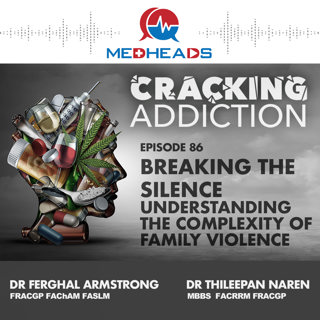
Breaking the Silence: Understanding the Complexity of Family Violence
Steve Herd is an expert in the field of family violence. In our first of a series of conversations, he explains that family violence is not just physical abuse. It includes emotional, psychological and sexual abuse as well. The abuser uses various tactics to maintain control over their partner, such as isolating them from friends and family, controlling their finances, and limiting their access to information.Herd also highlights the role of gender in family violence. He explains that men are more likely to use physical violence to control their partners. He argues that this is because society has traditionally given men more power and control over women, which has led to a sense of entitlement among some men.Overall, our conversation with Steve Herd sheds light on the complexity of family violence and its damaging effects on individuals and families. Understanding the root causes and different forms of abuse is crucial in order to prevent and respond to this pervasive issue.Discussions and comments in our videos are for informational purposes only and should not replace the advice of your medical professional. Please consult with your doctor before making any changes to your medical treatment or lifestyle.Latest Blogshttps://www.meducate.com.au/blogAbout Meducate ®Meducate provides online education for doctors, clinicians, health professionals and the public.See the website to browse the many different talks and courses available https://www.meducate.com.au
6 Apr 202314min

Trauma Assessment and Management
In this episode of Cracking Addiction, we are again joined by addiction psychiatrist Dr Dan Pham and discuss how to take a trauma history without further traumatising or triggering a patient. We also discuss the diagnostic criteria for PTSD and how to formulate this condition. In this episode, we discuss trauma-informed care and how to treat and manage trauma and PTSD, and what psychological and medical therapies may be useful to manage this condition, and briefly touch on some of the emerging research surrounding psychedelic-assisted psychotherapy in PTSD.Discussions and comments in our videos are for informational purposes only and should not replace the advice of your medical professional. Please consult with your doctor before making any changes to your medical treatment or lifestyle.Latest Blogshttps://www.meducate.com.au/blogAbout Meducate ®Meducate provides online education for doctors, clinicians, health professionals and the public.See the website to browse the many different talks and courses available https://www.meducate.com.au
29 Mars 202318min

Trauma, PTSD and Addiction
In the episode of Cracking Addiction, we are joined by Dr Daniel Pham an Addiction Psychiatrist working at Turning Point who discusses with us the differences and similarities between Addiction Medicine and Addiction Psychiatry. We discuss the term dual diagnosis and the interplay between mental health and substance use disorders. This episode focuses mainly on trauma, PTSD and its interplay with substance use disorders and we discuss how trauma occurs and how to diagnose trauma and PTSD. We also explore integrated care and how to manage patients with co-occurring trauma or PTSD and substance use disorders and we touch on trauma informed care and how to approach taking a trauma history.Discussions and comments in our videos are for informational purposes only and should not replace the advice of your medical professional. Please consult with your doctor before making any changes to your medical treatment or lifestyle.Latest Blogshttps://www.meducate.com.au/blogAbout Meducate ®Meducate provides online education for doctors, clinicians, health professionals and the public.See the website to browse the many different talks and courses available https://www.meducate.com.au
22 Mars 202320min
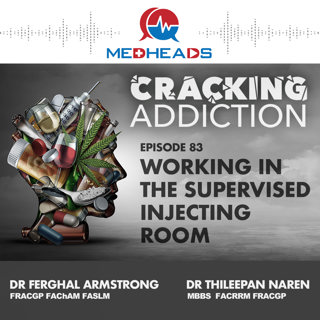
Working with Colleagues in the Grip of Addiction
Join us in this episode as we hear from Dr. Tony Weeks, a former Director of Anaesthesia at Alfred Health, as he shares his experiences in treating doctors with addiction and working in a medically supervised injecting room. Dr. Weeks speaks candidly about the challenges of helping colleagues with substance use disorders, and the complexities of treating doctors who are also struggling with addiction.After retiring from his work as an anesthetist, Dr. Weeks volunteered at a drug consumption room in North Richmond, Melbourne, where he helped patients find veins to inject into, assisted those who overdosed, and provided opioid substitution therapy. Through his vast and varied career, Dr. Weeks has seen firsthand the life-saving work that takes place in drug consumption rooms. He shares his insights on the evidence-based nature of harm reduction interventions, such as drug consumption rooms, and the importance of treating addiction as a public health issue.Don't miss this thought-provoking conversation with Dr. Tony Weeks, where he sheds light on the challenges and rewards of helping those struggling with addiction, including colleagues and fellow doctors.Discussions and comments in our videos are for informational purposes only and should not replace the advice of your medical professional. Please consult with your doctor before making any changes to your medical treatment or lifestyle.Latest Blogshttps://www.meducate.com.au/blogAbout Meducate ®Meducate provides online education for doctors, clinicians, health professionals and the public.See the website to browse the many different talks and courses available https://www.meducate.com.au
15 Mars 202341min
